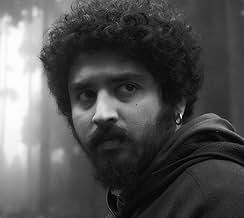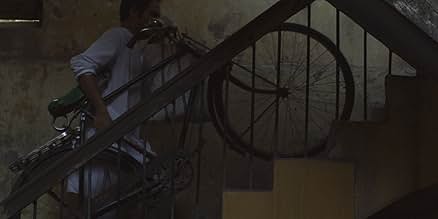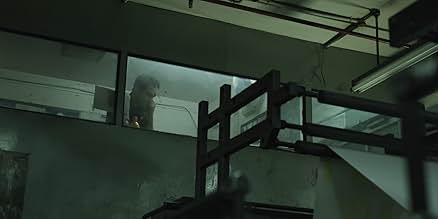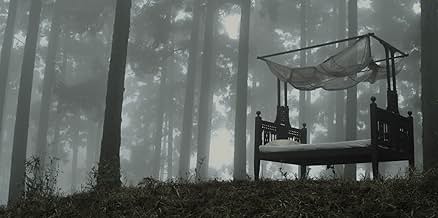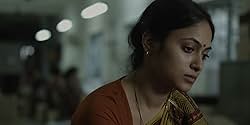VALUTAZIONE IMDb
7,9/10
1393
LA TUA VALUTAZIONE
Il racconto poetico della quotidianità di due vite comuni sospese nella durezza della recessione. Sono votate a un ciclo di lavoro e routine domestica, e lunghi momenti di attesa nel silenzi... Leggi tuttoIl racconto poetico della quotidianità di due vite comuni sospese nella durezza della recessione. Sono votate a un ciclo di lavoro e routine domestica, e lunghi momenti di attesa nel silenzio di una casa vuota.Il racconto poetico della quotidianità di due vite comuni sospese nella durezza della recessione. Sono votate a un ciclo di lavoro e routine domestica, e lunghi momenti di attesa nel silenzio di una casa vuota.
- Regia
- Sceneggiatura
- Star
- Premi
- 3 vittorie e 7 candidature totali
Basabdatta Chatterjee
- Woman
- (as 'Basabdutta Chatterjee')
Recensioni in evidenza
Awesome Camera work with marvelous background score..uff that sehnai!
Wow! And Wow! Aditya Vikram Sengupta's Asha Jaoar Majhe (English title: Labour of Love) is a cinema that grows on you - slowly, steadily and with love. It creeps up to you and snuggles close to your heart. And you embrace it with all you have, knowing it appeals to what's best in you and embracing it will help to keep that part of you alive.
Labour of Love is about a couple in Kolkata's version of apocalyptic world, a city under recession where a lower-middle class couple works complementary shifts to make ends meet. They re-count the notes after withdrawing money from the bank, reuse resources whenever possible and live a simple life of values. Most of their days are spent in a kind of suspended animation, waiting to flicker to life for a little reward at the end. It's about biding your time for that small window, an experience that the director makes the audience feel and experience. There isn't a soundtrack (mostly), as the film refuses to make things easier for the audience. There are no yardsticks to measure a perfect life and the film tellingly explores this point. The story is about love, shredded down to its essentials. As Henry David Thoreau had famously remarked about a stint of simple living in the woods, "I wanted to live deep and suck out all the marrow of life, to live so sturdily and Spartan-like as to put to rout all that was not life, to cut a broad swath and shave close, to drive life into a corner, and reduce it to its lowest terms." Labour of Love is love's Henry David Thoreau Test. It's not much use gushing about the sound-scape, Sengupta's attention to details and continuity and the two actors' near-perfect performances, as this is an experience that needs experiencing. Talking of Ritwick Chakraborty, his purple patch continues. If forgetting about the camera is the hallmark of accomplishment, he is now an accomplished actor.
One could argue that Sengupta uses the recession of emotions to manipulate us, hoarding events (just as an union leader complains that the management is using the recession to fatten purses) to accentuate the effect at the end, so you know how precious that smile feels. One could argue that having no dialogues at all is a gimmick, as some cellphone conversation could have taken place within the bounds of the couple's tight budget and unusual routine and circumstances. Even if these hold true, plaudits to Aditya Vikram Sengupta for even attempting what he has. Asha Jawar Majhe scores full marks for effort and he will leave cinephiles in Kolkata, and (judging by the number of awards he has bagged globally) elsewhere too, waiting for his next offering.
Labour of Love is about a couple in Kolkata's version of apocalyptic world, a city under recession where a lower-middle class couple works complementary shifts to make ends meet. They re-count the notes after withdrawing money from the bank, reuse resources whenever possible and live a simple life of values. Most of their days are spent in a kind of suspended animation, waiting to flicker to life for a little reward at the end. It's about biding your time for that small window, an experience that the director makes the audience feel and experience. There isn't a soundtrack (mostly), as the film refuses to make things easier for the audience. There are no yardsticks to measure a perfect life and the film tellingly explores this point. The story is about love, shredded down to its essentials. As Henry David Thoreau had famously remarked about a stint of simple living in the woods, "I wanted to live deep and suck out all the marrow of life, to live so sturdily and Spartan-like as to put to rout all that was not life, to cut a broad swath and shave close, to drive life into a corner, and reduce it to its lowest terms." Labour of Love is love's Henry David Thoreau Test. It's not much use gushing about the sound-scape, Sengupta's attention to details and continuity and the two actors' near-perfect performances, as this is an experience that needs experiencing. Talking of Ritwick Chakraborty, his purple patch continues. If forgetting about the camera is the hallmark of accomplishment, he is now an accomplished actor.
One could argue that Sengupta uses the recession of emotions to manipulate us, hoarding events (just as an union leader complains that the management is using the recession to fatten purses) to accentuate the effect at the end, so you know how precious that smile feels. One could argue that having no dialogues at all is a gimmick, as some cellphone conversation could have taken place within the bounds of the couple's tight budget and unusual routine and circumstances. Even if these hold true, plaudits to Aditya Vikram Sengupta for even attempting what he has. Asha Jawar Majhe scores full marks for effort and he will leave cinephiles in Kolkata, and (judging by the number of awards he has bagged globally) elsewhere too, waiting for his next offering.
The movie tests your patience a lot, and at times you wonder whether anything is going to happen at all, and perhaps that is the exact reaction the director wants to evoke from his audience. The pacing is slow, there are no dialogues , the story is told through background noise and unbelievably accurate shots of two people doing monotonous household chores. The camera-work is intriguing, unusual and beautiful in general- the camera often zooms in and lingers for a while on seemingly mundane things that are generally not highlighted on the big screen - soap bubbles in a bucket, a rooftop antenna , the clothesline .. And all this obsession with detail, the slow pacing , the impassive faces suddenly make sense in the last 5 minutes. The entire movie is a buildup for the ending, which is beautiful . It makes you want to watch the movie all over again.
I chanced upon the Iranian indie filmmaker Keywan Karimi's short film "Zan Va Shohar Karega" (The Adventure of the Married Couple) a few years ago. In spite of the obvious likeness, I prefer Aditya Vikram Sengupta's directorial debut.
The beauty of this film lies in the little things - the poetic collage of images ordinary lives are made of; artfully rendered and helmed with nuanced realism - every frame relatable, every moment pure, doused in everything Bengali.
Basabdatta Chatterjee outdoes the ever so brilliant Ritwick Chakraborty, so gracefully subtle in her expressions.
Arthouse films tend to be pretentious, mostly unappealing to us commoners, trying too hard to please global audiences. Asha Jaoar Majhe is a rarity; an unequivocal feat of grounded filmmaking.
The beauty of this film lies in the little things - the poetic collage of images ordinary lives are made of; artfully rendered and helmed with nuanced realism - every frame relatable, every moment pure, doused in everything Bengali.
Basabdatta Chatterjee outdoes the ever so brilliant Ritwick Chakraborty, so gracefully subtle in her expressions.
Arthouse films tend to be pretentious, mostly unappealing to us commoners, trying too hard to please global audiences. Asha Jaoar Majhe is a rarity; an unequivocal feat of grounded filmmaking.
"Asha Jawar Majhe" or "Labour of Love" is as much an ode to a recession hit Calcutta as much it is an eulogy of the rigors in a lower middle class couple's struggle for existence,yet united by love for few treasured moments in a day. The film is exclusively a silent film, yet more eloquent than any of its recent contemporaries. The brilliance and scale of the film can only be matched in recent times by a "Ship of Theseus" and rightfully it has won accolades over the International Festivals.
The viewer who goes in search of a story will be thoroughly disappointed as this is just a portrayal of a day in the life of this struggling couple essayed beautifully by Ritwick and Basabdutta, both working in alternate shifts to make their ends meet. But they are not love-lost, as they wait with honed self control and relentless patience for the early morning hours of union,when he returns from work and she is about to set out to. The "labour of love" is thus not fruitless, but is the strong bond that ties this couple,estranged for most of the day,owing to a debilitating economy.
It is totally a Director's film,executed brilliantly by the helmsman Aditya Vikram Sengupta, as his camera pans the North Calcutta suburbs, reminiscent of erstwhile opulence,yet now symbolic of a moribund state,through a poet's eye. Kudos to him for handling the plot with such sensitivity , as even the director had to undergo a Labour of Film Making to make his first film. The use of light and shadow reminds of Ray's "Aporajito" and the sound arrangement is nothing short of brilliant. But there are certain unexplained jump cuts and long stills too, flaws which doesn't remain with the viewer after the wonderful ending of the film. Ritwick has indeed become the "Irrfan Khan" of Tollywood in recent times and no one could play this role more convincingly.The vacant stare, the unhurried way he carries out his daily mundane routine, and yet the wait for the Golden moments of the day underplaying in his eyes is brilliant. He shows that one can portray despair without a sigh. Basabdutta complements him on all grounds. A final word for the sound arrangement as the film would have been incomplete without its brilliant execution,specially when there's no dialogue. It is a must watch for cine enthusiasts,poets and others who have an ebbing poet in them amidst the harsh realities of life. Looking forward to more such classics from the director in future.
The viewer who goes in search of a story will be thoroughly disappointed as this is just a portrayal of a day in the life of this struggling couple essayed beautifully by Ritwick and Basabdutta, both working in alternate shifts to make their ends meet. But they are not love-lost, as they wait with honed self control and relentless patience for the early morning hours of union,when he returns from work and she is about to set out to. The "labour of love" is thus not fruitless, but is the strong bond that ties this couple,estranged for most of the day,owing to a debilitating economy.
It is totally a Director's film,executed brilliantly by the helmsman Aditya Vikram Sengupta, as his camera pans the North Calcutta suburbs, reminiscent of erstwhile opulence,yet now symbolic of a moribund state,through a poet's eye. Kudos to him for handling the plot with such sensitivity , as even the director had to undergo a Labour of Film Making to make his first film. The use of light and shadow reminds of Ray's "Aporajito" and the sound arrangement is nothing short of brilliant. But there are certain unexplained jump cuts and long stills too, flaws which doesn't remain with the viewer after the wonderful ending of the film. Ritwick has indeed become the "Irrfan Khan" of Tollywood in recent times and no one could play this role more convincingly.The vacant stare, the unhurried way he carries out his daily mundane routine, and yet the wait for the Golden moments of the day underplaying in his eyes is brilliant. He shows that one can portray despair without a sigh. Basabdutta complements him on all grounds. A final word for the sound arrangement as the film would have been incomplete without its brilliant execution,specially when there's no dialogue. It is a must watch for cine enthusiasts,poets and others who have an ebbing poet in them amidst the harsh realities of life. Looking forward to more such classics from the director in future.
Lo sapevi?
- QuizThere are no words spoken by the characters in the film.
I più visti
Accedi per valutare e creare un elenco di titoli salvati per ottenere consigli personalizzati
- How long is Labour of Love?Powered by Alexa
Dettagli
- Data di uscita
- Paese di origine
- Lingua
- Celebre anche come
- Labour of Love
- Azienda produttrice
- Vedi altri crediti dell’azienda su IMDbPro
- Tempo di esecuzione
- 1h 24min(84 min)
- Colore
- Proporzioni
- 2.35 : 1
Contribuisci a questa pagina
Suggerisci una modifica o aggiungi i contenuti mancanti


